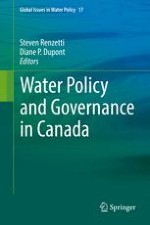2017 | OriginalPaper | Chapter
15. Indigenizing Water Governance in Canada
Authors : Lori E. A. Bradford, Nicholas Ovsenek, Lalita A. Bharadwaj
Published in: Water Policy and Governance in Canada
Publisher: Springer International Publishing
Activate our intelligent search to find suitable subject content or patents.
Select sections of text to find matching patents with Artificial Intelligence. powered by
Select sections of text to find additional relevant content using AI-assisted search. powered by
